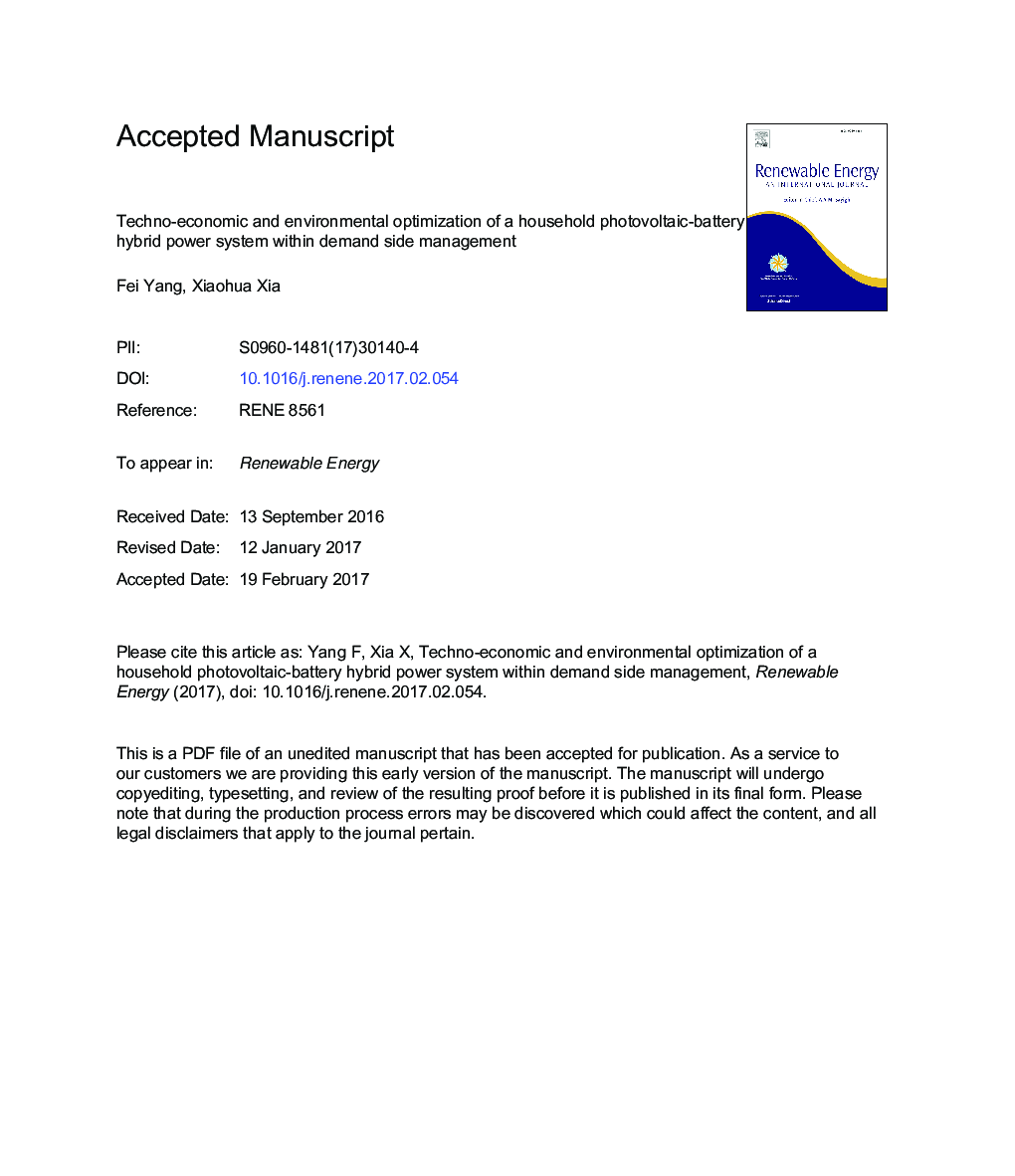| کد مقاله | کد نشریه | سال انتشار | مقاله انگلیسی | نسخه تمام متن |
|---|---|---|---|---|
| 4926500 | 1431596 | 2017 | 26 صفحه PDF | دانلود رایگان |
عنوان انگلیسی مقاله ISI
Techno-economic and environmental optimization of a household photovoltaic-battery hybrid power system within demand side management
ترجمه فارسی عنوان
بهینه سازی تکنولوژی و محیط زیست یک سیستم قدرت هیبریدی فتوولتائیک باتری خانگی در مدیریت تقاضا
دانلود مقاله + سفارش ترجمه
دانلود مقاله ISI انگلیسی
رایگان برای ایرانیان
کلمات کلیدی
انرژی خورشیدی، سیستم قدرت هیبریدی، کنترل بهینه، مدیریت سمت تقاضا،
ترجمه چکیده
این مقاله یک سیستم مدیریت انرژی یک سیستم قدرت هیبریدی فتوولتائیک خانگی را در مدیریت تقاضای مصرف در زمان استفاده از تعرفه برق ارائه می دهد. این سیستم با استفاده از سوئیچ الکتریکی ارزان، شارژر خارج از قفسه و مبدل های آن، آسان است. مدل های سیستم های کنترل که ترکیبی از هر دو سطح اعطای قدرت و سطح برنامه ریزی خانه را ارائه می دهند برای صرفه جویی در هزینه های مصرف انرژی و مصرف انرژی ساکنین از شبکه با محدودیت های عملی که به شدت رضایت دارند. علاوه بر این، میزان نارضایتی در میزان راحتی ساکنان در مدل های سیستم کنترل در نظر گرفته شده است. مشارکت در میان هزینه های عملیاتی، مصرف انرژی و ناراحتی در نظر گرفته شده است و یک مشکل بهینه سازی چند هدفه فرموله شده است. استراتژی های کنترل بهینه با حل یک مسئله برنامه ریزی غیر خطی عدد صحیح مخلوط مشتق می شوند. نتایج شبیه سازی نشان می دهد که هزینه های انرژی و مصرف انرژی از شبکه می تواند تا حد زیادی با استراتژی های پیشنهادی کاهش یابد. این نتایج برای مشتریان مهم است تا از عدم اطمینان عمده خود در تعیین اینکه آیا به تازگی نصب و یا به روز رسانی به چنین سیستم های قدرت هیبرید فوتوولتای باتری فلج است.
موضوعات مرتبط
مهندسی و علوم پایه
مهندسی انرژی
انرژی های تجدید پذیر، توسعه پایدار و محیط زیست
چکیده انگلیسی
This paper presents a power management system of a household photovoltaic-battery hybrid power system within demand side management under time of use electricity tariff. This system is easy to implement by employing cheap electrical switches, off-the-shelf chargers and inverters. Control system models combining both power dispatching level and home appliance scheduling level are proposed to minimize the residents' energy cost and energy consumption from the grid with the practical constraints strictly satisfied. In addition, the resident comfort inconvenience level is considered in the control system models. The trade-off among operating cost, energy consumption and inconvenience is considered and a multi-objective optimization problem is formulated. The optimal control strategies are derived by solving a mixed-integer nonlinear programming problem. Simulation results show that the energy cost and energy consumption from the grid can be largely reduced with the proposed strategies. These results are important for customers to dispel their major uncertainty in determining whether to newly install or update to such photovoltaic-battery hybrid power systems.
ناشر
Database: Elsevier - ScienceDirect (ساینس دایرکت)
Journal: Renewable Energy - Volume 108, August 2017, Pages 132-143
Journal: Renewable Energy - Volume 108, August 2017, Pages 132-143
نویسندگان
Fei Yang, Xiaohua Xia,
